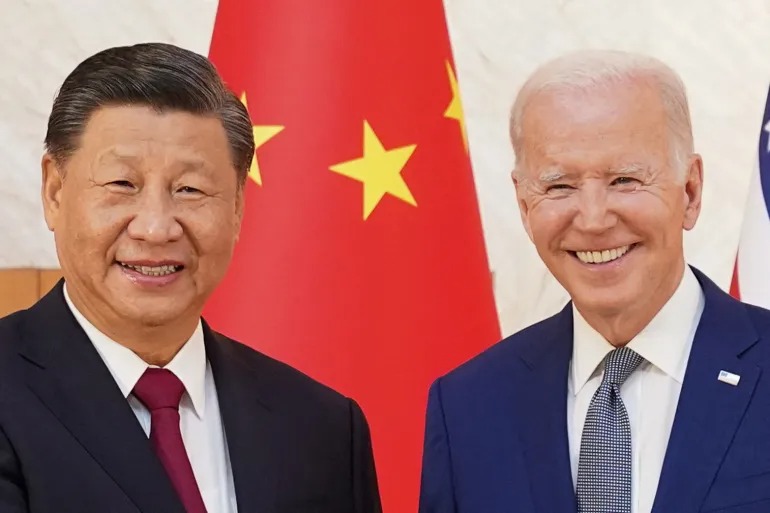The global stage is poised for a significant diplomatic event as promises of a meeting between U.S. President Joe Biden and Chinese President Xi Jinping loom on the horizon. This anticipated summit comes after a high-profile visit to Washington, D.C., by China’s top diplomat, Foreign Minister Wang Yi. While the White House remains cautious in confirming the Biden-Xi meeting, a readout of the recent talks between Wang Yi and US National Security Adviser Jake Sullivan suggests that both sides are actively working towards this historic rendezvous.
High-Level Diplomacy Leading to Anticipated Summit
The United States and China are currently eyeing a meeting at the Asia-Pacific Economic Cooperation (APEC) summit scheduled for November in San Francisco. The APEC summit is a forum that brings together world leaders and business magnates, providing an ideal backdrop for diplomatic engagement of this magnitude. The last time Presidents Xi and Biden met was at the G20 summit in Bali last year, making this upcoming meeting all the more significant.
Foreign Minister Wang Yi’s visit to Washington, D.C., was part of a three-day diplomatic mission. During his stay, Wang met with President Biden and held discussions with high-ranking US officials, including Secretary of State Antony Blinken. While China’s Ministry of Foreign Affairs in Beijing did not immediately confirm the details of the visit, they acknowledged discussions aimed at addressing the often-acrimonious relationship between the two nations.
Wang Yi conveyed China’s commitment to enhancing and stabilizing its relationship with the United States, emphasizing the principles of “mutual respect, peaceful coexistence, and win-win cooperation.” These sentiments were echoed during his meeting with Secretary Blinken, underscoring China’s dedication to more harmonious bilateral relations.
Geopolitical Concerns Discussed During Chinese Diplomat’s Washington Visit
Geopolitical issues also featured prominently in the discussions between Wang Yi and US officials. The ongoing Israel-Hamas conflict, the Russian invasion of Ukraine, and the forthcoming presidential election in Taiwan were topics of substantial discourse. China has asserted its neutrality in the Ukraine conflict, although it has faced accusations of supporting Russia’s economy in defiance of Western sanctions.
In the Middle East, observers are hopeful that China could play a more conciliatory role due to its strong relationships with both Israel and Arab states. While the United States provides military aid to Israel and Ukraine, it has historically acted as a mediator in the Israel-Palestine conflict. In light of current tensions in Gaza, where Israel has hinted at a possible ground invasion, both countries find themselves in a position to collaborate in defusing the situation.
During his meeting with Wang Yi, President Biden emphasized the need for the United States and China to work together to address global challenges, marking a potential turning point in their relations. The United States has previously signaled its interest in improving bilateral ties and establishing “guardrails” to prevent disagreements from escalating into military conflicts.
US-China Relations at a Turning Point: From Trade Wars to Middle East Cooperation
US-China relations experienced a significant deterioration during the tenure of former President Donald Trump, who initiated a trade war with China. Tensions have persisted since President Biden’s inauguration in January 2021, with disputes ranging from issues in Hong Kong and Taiwan to allegations of spy activities and semiconductor sanctions.
However, recent events, including a meeting between President Xi and Secretary Blinken in Beijing in June and another between Xi and US Senate Majority Leader Chuck Schumer earlier this month, indicate a potential thaw in relations.
Yet, challenges remain. The United States has accused China’s air force of engaging in dangerous maneuvers over the South China Sea, nearly resulting in a collision between a US B-52 bomber and a Chinese J-11 jet. During Wang Yi’s meeting with President Biden, the President urged China to deescalate similar behavior towards the Philippines, a US treaty ally frequently harassed by China in the disputed South China Sea waters.
Despite the potential for collaboration in the Middle East, US-China relations continue to be strained concerning Taiwan, a self-ruled democracy claimed by China’s Communist Party as part of its territory. Taiwan will hold elections in early January, an event that typically triggers an angry response from Beijing. China has historically attempted to influence election outcomes through various means, including online misinformation campaigns and military exercises in the Taiwan Strait, signaling the possibility of using force.
A military conflict between China and Taiwan could draw the United States into the fray, as it has pledged to support Taiwan’s defense, albeit without a commitment of ground troops. As these geopolitical dynamics evolve, the anticipated meeting between Presidents Biden and Xi takes on heightened importance, offering a potential turning point in US-China relations and global stability.
















